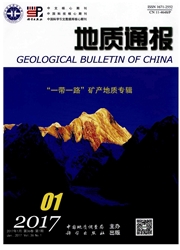

 中文摘要:
中文摘要:
综合露头剖面、砂岩碎屑组分、地球化学、阴极发光等资料的研究,对西藏白朗地区南部三叠系沉积环境及物源开展了研究。该区三叠纪地层以灰黑色泥岩、浅灰白色石英砂岩、长石石英砂岩、灰色灰岩为主,沉积背景为拉轨岗日被动陆缘盆地的浅海-半深海环境。碎屑岩及其地球化学分析结果反映,物源总体来自克拉通内部。阴极发光结果表明,物源区石英主要为变质成因,次为火成岩成因。综合判定,研究区该套地层为下—中三叠统吕村组和上三叠统涅如组,物源区来自南部高喜马拉雅基底杂岩带。
 英文摘要:
英文摘要:
Outcrop section, sandstone clastic composition, geochemistry and cathodoluminescence images are comprehensively studied so as to analyze the depositional setting and provenance of Triassic nappe in the south of Bailang County, Tibet. Through field geological survey, the authors found that the lithology is composed of black mudstone, gray quartz sandstone, feldspar-quartz sandstone and gray limestone. The depositional background displays a neritic-bathyal environment in the Lagangguiri passive continental margin basin. Clastic composition and geochemistry indicate that the provenance was mainly derived from the craton basin. Cathodoluminescence images prove possibility of metamorphic, igneous rock sources. It is thus concluded that the strata consist of Lower-Middle Triassic Lücun Formation and Upper Triassic Niru Formation, with the provenance derived from the southern Higher Himalaya basement complex rock belt.
 同期刊论文项目
同期刊论文项目
 同项目期刊论文
同项目期刊论文
 期刊信息
期刊信息
